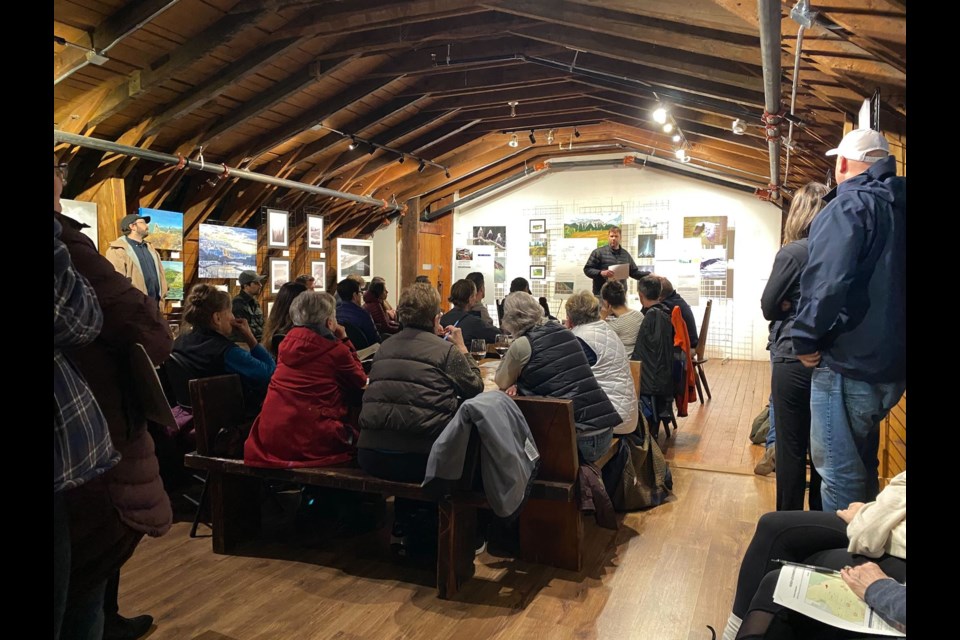—Updated Saturday Dec. 21 —
The developers behind a proposed co-living space in Brackendale have withdrawn their variance permit to allow for two principal dwelling units on the same lot.
The variance permit application for the development located at 41824 Government Rd would have allowed for two buildings, each with 16 bedrooms, with self-contained washrooms, a shared living room and one kitchen space.
In an email shared with The Squamish Chief on Dec. 9, District planner Kerry Hamilton said the proposal for one single dwelling unit is still being considered by the muni.
"A Building Permit for one single dwelling unit is still under review with five parking spaces and one driveway access," she wrote.
"Should a Subdivision application or different Development Variance Permit be submitted, a new development sign will be posted on the site. Please note, no signs are posted for Building Permit applications."
The Squamish Chief reached out to the developers behind the project but did not receive a response by publication time.
—Original story—
The developers behind a new co-living space in Brackendale shared more details surrounding the project at an information session on Thursday night.
At a jam-packed Brackendale Art Gallery on Nov. 14, the developers—who are seeking a variance to allow two principal dwelling units on the same lot—faced a tough crowd of unhappy residents who are against the project.
“The variance that we are asking for is to allow two homes on one property, and the reason why we think it's appropriate is because the size of the lot is quite large,” developer Michael Oord said.
The proposal for the property at 41824 Government Road is for two buildings, each with 16 bedrooms, with self-contained washrooms, a shared living room and one kitchen space. The two buildings would be privately owned, and the units proposed as market rentals designed to provide co-housing, and “more affordable” opportunities in Squamish.
“The reason this idea came up is because you have rental houses all over town that are being rented to multiple individuals, and they each rent a room. And so this is just taking into consideration this new form of housing,” Oord said.
“It's much needed in every community; it provides different housing forms and variety within the neighbourhood. It all conforms to the [official community plan]. This is all permitted under the regulation that exists today.
“So aside from the variances that we are asking for, there's no issues with the proposed building based on the existing land use controls.”
What will the variances mean?
Oord and his business partner Grant Gillies are asking for a variance to allow two principal dwelling units on the same lot.
“Originally, the property that we own was actually two lots, and at some point, I think it was around 1976 or so, someone purchased both lots and amalgamated them into one,” Oord said.
“When we approached staff at the District of Squamish, we had asked to get two lots, and we were encouraged to not subdivide the property, but instead ask for development variance that would allow a second home on the property.”
The second variance is about parking.
District director of community development, Jonas Velaniskis and municipal planner Kerry Hamilton were also at the information session and clarified to the audience that at least one building would go ahead on the site even if the variances were rejected.
“The application is not whether there can be a house built on a property or not. It's the variance for going from one dwelling unit to two, and there's also a parking variance request for exceeding the maximum number of parking stalls,” Velaniskis said.
“We have a limit on parking per dwelling unit, up to five parking stalls per unit, and the request is to go above that.”
The developers said if the parking variance is approved, the property could see up to 33 parking spaces made available on-site, with 14 built underneath the building.
It would also mean there would be only one driveway on the property, as opposed to two, should it fail, and the developers then apply to subdivide and build two houses instead.
“Either we do this or we subdivide, it’s one of the two,” Gillies said.
“You’ll have more driveways with the subdivision than you will with this [variance].
Oord said the parking variance could allow for “one parking stall per person in the building as there are 33 [stalls] shown on the plans.”
The developers were also adamant that only one person would be allowed to live in each room to ensure no more than 16 people were residing there at one time.
A house manager would also be on-site to manage the co-living space.
Resident concerns
Throughout the evening, in what was organized as a question and answer session, residents shared their frustration over the variance application and the development as a whole.
Repeatedly throughout the two-hour session, audience members reiterated the notion that the co-living house was, in fact, not a house but more like a hostel, hotel, or commercial business.
Frustration over a lack of community consultation was also a hot topic. The developers responded by saying that because they submitted a building application for a house, they “weren’t required to do any consultation.”
One audience member shared her worries that the property might be used to house FortisBC pipeline workers as a result of the workers' camp being rejected.
Others feared for the safety of children and parents who walk and bike to the nearby schools, because they could be affected by the increase in cars on the road trying to access the property.
Velaniskis and Hamilton said they will take the comments made and submitted at the meeting back to District staff for their consideration in their report to council.
The variance application will make its way to a District of Squamish council meeting at a later date.
For more information on the development, visit the District of Squamish website.




